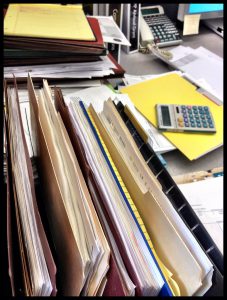
Toss or Keep?
Out with the old year. Out with the last decade. And finally, out with that mile-high pile of papers that serves no purpose except for the cat to knock over. Bring on the New Year! Bring on the new decade. Bring on that recycle container and fill it up! Below is a short declutter questionnaire. Ask yourself these questions as you sort through your piles. Answering them will help you gain momentum as you begin to clear the clutter and reorganize your record-keeping.
- How long has it been since I needed this?
- How many copies do I need?
- Can I find this information somewhere else (the internet, etc.)?
- If I keep this, what will I have to get rid of to make room for it?
Now get to it!
Obviously some records should be held on to permanently while others warrant only holding on to for a measured period of time. Lastly, that junk mail should never make it past the trash can. Toss it immediately.
Some records are considered permanent documents. These include:
- Birth and death certificates
- Citizenship papers
- Adoption papers
- Marriage licenses
- Divorce decrees
- Social Security cards
- Military records/discharge papers
- Passport
- Education, certifications, licenses
- Employment records
- Medical records
- Household inventory
- Safe deposit box inventory
- Defined-benefit plan documents
- Life-insurance policies
- Will/ Estate-planning documents
- Advance directives
- Records of past real estate transactions
- Settled suits
- Legal correspondence
Keep tax returns for seven years.
Hold onto these records until they terminate or are no longer needed. Keep:
- Warranties until they expire or you no longer own the item
- Loan documents until the loan is paid off
- Auto title until you sell
- Investment files- Keep purchase confirmations, year-end account statements and the most recent prospectus or annual report until you sell
These records should be kept current:
- Financial account information
- Credit and debit card receipts
- Loan agreements
- Passwords
- Contact information for:
-
- All accounts
- Family/friends
- Medical providers
- Prescription information-who prescribed and their contact information, what drug, what dosage, special instructions if any, and where to refill
Lastly, the previous month’s bill can be discarded after the new statement arrives reflecting last month’s payment was received and posted.
Organizing and reducing your paperwork makes your home safer – think fall prevention. You save money when bills are paid on time because you know exactly where they are filed. In cases of an emergency, being able to quickly access a much-needed document helps to reduce the stress of the situation. Finally, anxiety is reduced when you get your act together. Organizing your paperwork definitely improves the quality of life. Go ahead and go for it! You will be glad you did.
 0
0
